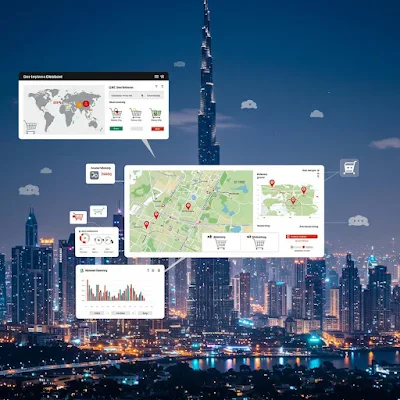Where Is UAE eCommerce Automation Headed? Tools, Logistics, and Growth Opportunities
UAE’s eCommerce boom isn't slowing down—it's accelerating with AI, chatbots, and logistics automation redefining every click-to-doorstep journey.
From personalized email flows to inventory forecasts powered by AI, UAE's eCommerce businesses are rapidly shifting toward full-stack automation. In this market, speed and precision aren't luxuries—they're expectations. What separates growth-ready brands from those stagnating is no longer product, but process. And in the UAE, process is being automated.

What Are the Core Pillars of eCommerce Automation in the UAE?
Automation in UAE’s online retail scene hinges on four main components: smart logistics, AI-driven marketing, chatbot-based customer service, and inventory prediction. Platforms like Swftbox offer real-time order fulfillment APIs that connect seamlessly with Shopify and WooCommerce, reducing delivery delays by over 30%. Tools such as Klaviyo automate marketing emails and SMS campaigns tailored by customer behavior. Together, they form a web of seamless execution—where actions are data-informed and responses instantaneous.
How Do UAE Businesses Implement Inventory Prediction Effectively?
Inventory mismanagement costs businesses millions each year, especially during peak seasons like Ramadan or Eid. Predictive tools integrated into order management systems are now a must. Platforms like ClickPost and Swftbox offer predictive stock level analysis, taking into account sales velocity, weather patterns, and cultural calendars. By automating restock triggers and alerting fulfillment centers ahead of demand surges, businesses stay agile and avoid dead stock or lost revenue.
Which Tools Are Actually Used in the UAE Right Now?
Swftbox dominates logistics automation for SMEs, offering barcode-level tracking and regional coverage across GCC countries. It plugs into Shopify with real-time shipping updates and label printing. For marketing, Klaviyo stands out—enabling dynamic customer segmentation, pre-built campaign flows, and A/B testing. Judge.me and ReConvert handle reviews and upsells automatically. Together, they reduce manual labor, cut down customer churn, and increase lifetime value. For instance, an SME using Klaviyo’s automated Eid promotion flow saw a 48% increase in repeat purchases within a week.
What Should UAE Brands Consider Before Adopting Automation?
Technology alone won't save a poorly optimized store. Brands must first identify pain points—are shipping delays a core issue? Is customer engagement low? Is abandoned cart recovery inefficient? Only after pinpointing weaknesses can the right tools be selected. Swftbox, for example, excels in logistics but doesn’t handle customer service. That’s where WhatsApp chatbot integrations or Zendesk automations come in. Think of automation as assembling a surgical team—each tool must specialize and work in harmony. A piecemeal approach creates more problems than it solves.
How Can UAE eCommerce Players Monetize Through Automation?
Automation isn’t just about saving time—it’s a profit engine. Brands using inventory triggers avoid overstocking. Dynamic pricing tools adjust offers based on real-time market behavior. Predictive personalization boosts conversion rates by tailoring emails, site banners, and product suggestions on-the-fly. Klaviyo’s integration with over 350 channels means unified messaging across SMS, email, and ads—creating a flywheel of data refinement and sales lift. The ROI isn’t just theoretical—UAE stores using these stacks see up to 4.3x revenue per visitor increase compared to manual systems.
Where Is UAE’s eCommerce Automation Heading in 2025 and Beyond?
Expect three trends: micro-automation at SKU level, warehouse robotics integration, and AI-led customer journey mapping. Government-backed innovation hubs in Dubai are already testing AI-driven delivery bots and auto-replenishment systems. With swftbox expanding toward end-to-end smart supply chains, and Klaviyo baking in GPT-style copy assistants, the next leap is total intelligence—not just efficiency. UAE is positioning itself not only as a consumer of global eCommerce tools but as a generator of regional automation blueprints. The future of online retail will likely be written in Arabic—with a backend coded in bots.
Main keywords: UAE eCommerce automation, Swftbox, Klaviyo, Shopify UAE, logistics SaaS, predictive inventory, chatbot automation, SMS marketing UAE, ClickPost API, GCC logistics platform
.jpg)
